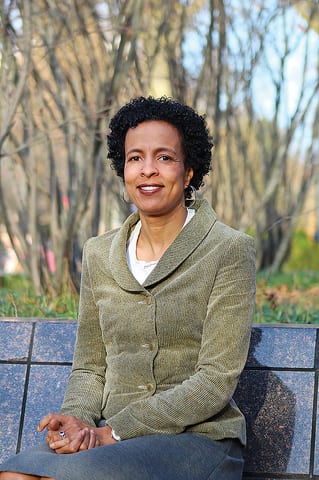Growing up in a small town in Ohio, Cynthia Young, now chair of the Department of African American Studies at Penn State, lived in a predominantly Jewish community.
Young related to her Jewish friends, who had family Holocaust stories to share, as people who face discrimination.
But it was difficult being one of the few black people in schools that taught little about such things as slavery or the civil rights movement.
“I lived in a world that did not acknowledge my culture or other cultures,” she says.
In those years, Young filled that blank space by learning through books and her family.
Now, through the Sawyer Seminar Series at Penn State, Young is helping to give others that learning platform she once longed for.
A team of Penn State faculty led by Young last fall received a $225,000 charitable grant from The Andrew W. Mellon Foundation’s Sawyer Seminars program to examine racial disposability and cultures of resistance.
The seminars will foster a series of timely conversations on such topics as immigration, policing, protests, and even President Trump.
Young, who is an associate professor of African American Studies and English and earned her Ph.D. at Yale, hopes to reach a wide audience. While the seminars are largely attended by students, they are open to the public and will only achieve their full potential by reaching the entire community, she says.
The backgrounds of the presenters vary and range from political activists to someone who teaches in prisons. They come from around the country and the world.
The department worked with State College Area School District and Penn State’s Office of Educational Equity to host Marcus Rediker and Tony Buba at The State Theatre last month for a screening of their film, Ghosts of Amistad: In the Footsteps of the Rebels. The next day, Rediker and Buba visited State College Area High School and met with members of the junior class, who had watched the documentary with their social studies classes.
Young says the students, who are predominantly white, were very engaged in the discussion.
Even though racial tensions are still present in our society, we are making progress by engaging in diverse dialogues around the country, she says
Where you live determines so much of your social and cultural interaction, Young says.
“People don’t have many opportunities to test or challenge their stereotypes or their beliefs,” she says.
In terms of modern-day segregation, “People live in neighborhoods with people who share most aspects of their identity – race, economic class, and education. Consequently, many aspects of their life are determined by that residential segregation – who they date/marry, where their children go to school, where they work or go to church, etc.”
Young notes that, “We see people of different races and ethnicities interact with one another at malls, restaurants, and public parks, but they are primarily in their own silos without much interaction with people who don’t look and think like them.
“The main goal is to change this,” Young says.
The series at Penn State runs through the spring of 2019. Discussions this month will include homeownership and urban crisis, as well as privilege and the politics of protest. To learn more about the Sawyer Seminar series at Penn State, visit sites.psu.edu/raceresistsawyer/
Reach Hinaa Noor at [email protected].



